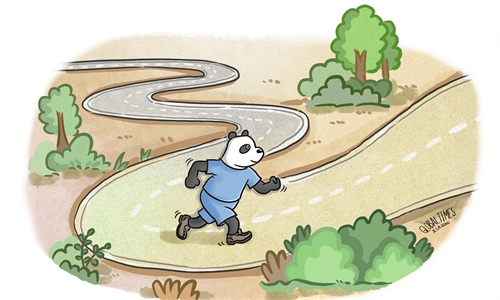
File photo: China US
Editor's Note:As the dialogue between China and the US at the governmental level resumes, an enhanced Track II diplomacy, including the conversation between Chinese and US scholars, shows its particular role in easing the bilateral ties. In a recent webinar, Wang Wen (Wang), professor and executive dean of Chongyang Institute for Financial Studies at Renmin University of China, and Dennis Wilder (Wilder), a senior fellow with the Initiative for US-China Dialogue on Global Issues at Georgetown University and former National Security Council's director for China, answered questions concerning important issues such as China-US ties and the upcoming US election.
Host: As a top Asian affairs expert, you believe that the China-US relations are the most important relationship of the 21st century and we have to get it right. What is driving the tension in China-US relations? How can Washington and Beijing stabilize their relationship? And how do you think we can find a common ground again?
Wilder: I do applaud President Xi and President Biden for their meeting in Bali last year, and for trying to put a floor under what has become a very dangerously deteriorating relationship. The visit by the US secretary of commerce, where meaningful decisions were made on a working group to advance trade, investment and tourism was extremely positive. But I do have real concerns about whether the new floor under the relationship is actually made of hardwood, or if it's made of plywood, which can easily split.
For example, it's worth noting that no senior Chinese official has visited Washington in the seven months since the balloon incident and military-to-military relations are completely frozen with no end in sight to the impasse over the sanctions against the Chinese defense minister.
We have to be honest and say that trust really remains at an all-time low in this relationship. Beijing publicly states that Western countries, led by Washington, are committed to all-around containment and suppression of China. At the same time, the American national security strategy also bluntly asserts that China plans to replace the US as the world's leading power and that China is the only competitor with both the intent and means to reshape the international order.
As hopeless as the current impasse may seem, I would remind you that we have been through tough times before. We have been able to find diplomatic ways to bridge the divide before. What we need today is a similar, quiet, strategic discussion between two interlocutors chosen by the presidents to pursue a new Modus Operandi, an arrangement or agreement allowing conflicting parties to coexist peacefully, either indefinitely or until a final settlement is reached.
In summary, let me just say that competition between the US and China is not going away. We are the world's leading powers, and this will be a permanent fixture of the international order. Strategic competition can actually be healthy and indeed can make both parties stronger. However, it also could turn into a zero-sum game, leading to a new cold war with disastrous consequences.
Host: In recent months, we have seen the Secretary of State Antony Blinken, Treasury Secretary Janet Yellen, Special Presidential Envoy for Climate John Kerry, Doctor Henry Kissinger, and Secretary of Commerce Gina Raimondo visit China. What do you think both sides can do to prevent a sort of gray rhino event from happening and rebuild our relations?
Wang: A lot of people often talk about how to reconstruct the China-US relationship. I think for the governments of the two countries, the most realistic idea is how to prevent and manage a crisis. But for scholars like us, we should consider rebuilding China-US relations, which is to find a way for the two countries to coexist.
At present, both China and the US, especially this year, have a very popular and very similar argument that the other side will lose. In recent years, the American media are likely to say, China is weakening and has become a "ticking time bomb." Also, there are many people in China who say the US is weakening, declining or even collapsing.
Now these two types of similar views are deeply influenced by the realist theory in international relations. They believe that the so-called strategic competition between major powers can only be a zero-sum game.
But in fact, in the past few years, there has been a group of institutional liberals in Europe and the US who are studying the possibility of the future of permanent peace. I have three suggestions for the two countries' leadership. First, I think the two countries must break through the circles of the realistic theories. The future of China-US relations is not just a zero-sum game. Quite frankly, China is a country with 5,000 years of history and uninterrupted civilization, and the US has been the most successful country in modernization in the past 200 years. Both parties must acknowledge the other's great greatness, and neither should imagine that the other would collapse. Scholars from both countries must think about how China and the US can coexist and develop together.
The second point I want to share is that the public opinion elites of both countries must really understand each other in the post-pandemic era. After three years of physical isolation, we have become strangers. Finally, we have to maintain mutual communication.
Host: 2026 will mark the 250th anniversary of the founding of the US. Can the US and China establish a long-term sustainable framework for managing bilateral competition in the 21st century?
Wilder: 200 years ago, when we invented the American democratic system, institutions and government, Americans were frankly arrogant about that system. We believe it's the best system we had tried. But at the same time, China has 5,000 years of culture and a system based on Confucianism. That is quite different from the American value system. We have to find a way for these two very different models of governance and society to coexist, and we're struggling with that at this moment. So whoever the president is, in 2026, they have to have a better understanding of China, its history and its cultural strengths.
I think there are some in America who think that we can bring down the government of China, and that's a very dangerous thought. But I do think if a new president can be trained to understand better these cultural differences and how to bridge them, we can find a way to get along.
Host: Considering the US election in 2024, what is the potential for a thaw in relationship?
Wang: I think China and the US now have a major misunderstanding about each other. In my opinion, the two countries have to adapt to build a long-term relationship.
But even though we have been in tension for a long time, it doesn't mean we can do nothing. I think at least there are four urgent things that could be done at a bilateral level. First, both sides should lift the sanctions imposed on some people of the other side, especially to enhance cultural exchanges at the scholarly level.
Second, in response to the trade war, I think the two sides should cancel some tariffs. The third point is to remove restrictions on high-tech investment, so that the investors on both sides can share the dividends of the technological progress. The fourth is to avoid the further deterioration regarding the Taiwan question.
In short, it is impossible for China and US relationship to become very good in the foreseeable future. But even if we have to set our expectations low, we can do more on many practical issues.
Wilder: I think that increasing the dialogue in the China-US relationship is very important. But we have to be realistic about the next period and the difficulties that we're going to face. The American election cycle is going to be brutal. It's going to be a highly-fought battle between the Republicans and the Democrats, and the rhetoric is going to be very harsh on China.
I think you're going to find that both Democrats and Republicans are going to use China as a scapegoat, a way to distract from real issues in the US. I'm worried about the relationship and what can happen during this election cycle. So, I think it's going to be up to the professionals, the diplomats, the scholars, to try and keep the relationship stable while getting through a period that may be tough.


